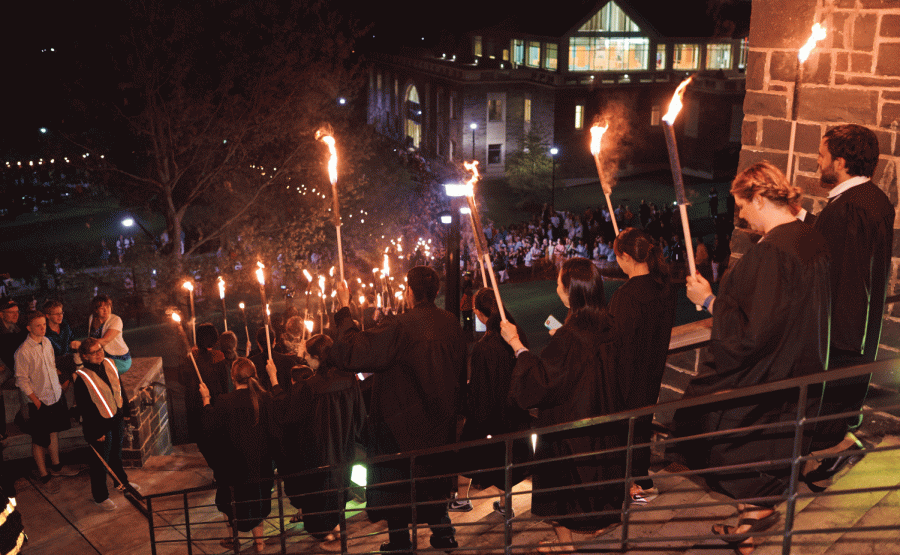Torchlight Continued: Loving Others by Learning
Listening to others is just as important as voicing your own opinion. As theTorchlight debate continues, Colgate peers shouldsupport one another even in light of disagreement.
I want to begin by acknowledging that the experiences I will be discussing here are not my own. These experiences will never be mine, but they belong to those I love. People who are beloved to me are in pain because of these experiences, pain which is often pushed to the side and negated. I won’t discourse too far on the topic, but perhaps this is the reason that the whole Torchlight and robe debate exists in the first place – this campus is not conducive to particular voices.
This debate is not one about rational argumentation (although a rational argument can be furnished with ease), but rather it is a time for listening and considering sentiments. So far, the emotional aspect of this debate has not been fully fleshed out. We have mostly heard arguments about retaining traditions that are deeply rooted, and how the torches and robes are not always to be associated with the Ku Klux Klan (KKK). I don’t see much of an argument in these points, but rather people grasping for something to hold onto because they feel unsafe without it. These people need something old to cling to for a sense of identity, and they marginalize people on the way. Saying that robes and torches are or have been used in contexts other than the KKK does not dissociate the two, and it certainly does not steal away the distress of my peers. In retaining these traditions, people are made to suffer for the sake of others’ inability to progress past traditions that are not only offensive, but conjure memories and feelings that are nothing short of traumatizing.
I, however, cannot even begin to understand this debate – nor can many of my peers – because this debate is not about the experiences of those unaffected, namely the majority of white students. I, as a white man, am not in a place to comment on whether or not these seemingly arbitrary traditions are offensive. Rather, it is more my place to listen to the thoughts and feelings of those who are upset by the tradition. I can’t possibly understand the experience of someone who is pained by seeing torches and robes at Torchlight because I myself am not personally offended, but if my peers, and those I love, are hurt by the tradition, then it’s time for it to cease. This is ultimately about feelings. Feelings that aren’t my own, but the feelings of those for whom torches and robes are abhorrent.
In her recent article “Unity: More Important than Tradition,” Ciara Swan talked about her grandmother’s experience and how upset this tradition makes her grandmother. I want to pause here for a moment and consider that if even one individual is this disturbed by Torchlight, then we should throw off the tradition. I want the elder Mrs. Swan to be exuberant at her granddaughter’s graduation. I want my peers to seriously consider that a number of students every year are so troubled with this tradition that they skip the ceremony altogether. These students work tirelessly for four years only to be unable to celebrate an enormous moment in their lives because they cannot be at ease doing so. And why are they left uncomfortable? Because many of the other students – students who, like myself, do not experience many of the negative feelings that surround the ceremony – want to keep some arbitrary tradition. Let’s be real here, it’s just an article of clothing and a torch at the end of the day for those who aren’t affected, and these are both objects we should be more than willing to jettison for the sake of our peers and loved ones.
This is about Colgate becoming safe, open and accepting for everyone. This is about respecting each other’s sentiments. This is not about people who are unaffected, and this is most certainly not about the people who, like myself, cannot possibly understand the experiences of those marginalized on this campus. For many of us on this campus, it’s time for us to understand that we can never understand. These are not our own experiences, and when we ignore the sentiments that our peers are sharing with us we are further marginalizing them and negating their voices. To be quite blunt, this is not the place for white people to speak. It’s time for us to take a seat, shut up, listen and learn. One more time for those who can’t get this right: listen and learn. This is an issue on which we need to listen to the voices of those who are offended by the historical precedent.









